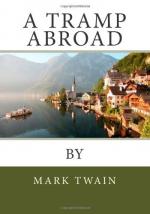Even the cumbersome German construction is not able to take the pathos out of that picture—indeed, it somehow seems to strengthen it. This item is dated away back yonder months ago. I could have used it sooner, but I was waiting to hear from the Father-stork. I am still waiting.
“Also!” If I had not shown that the German is a difficult language, I have at least intended to do so. I have heard of an American student who was asked how he was getting along with his German, and who answered promptly: “I am not getting along at all. I have worked at it hard for three level months, and all I have got to show for it is one solitary German phrase—’zwei Glas’” (two glasses of beer). He paused for a moment, reflectively; then added with feeling: “But I’ve got that solid!”
And if I have not also shown that German is a harassing and infuriating study, my execution has been at fault, and not my intent. I heard lately of a worn and sorely tried American student who used to fly to a certain German word for relief when he could bear up under his aggravations no longer—the only word whose sound was sweet and precious to his ear and healing to his lacerated spirit. This was the word DAMIT. It was only the sound that helped him, not the meaning; [3] and so, at last, when he learned that the emphasis was not on the first syllable, his only stay and support was gone, and he faded away and died.
3. It merely means, in its general sense, “herewith.”
I think that a description of any loud, stirring, tumultuous episode must be tamer in German than in English. Our descriptive words of this character have such a deep, strong, resonant sound, while their German equivalents do seem so thin and mild and energyless. Boom, burst, crash, roar, storm, bellow, blow, thunder, explosion; howl, cry, shout, yell, groan; battle, hell. These are magnificent words; the have a force and magnitude of sound befitting the things which they describe. But their German equivalents would be ever so nice to sing the children to sleep with, or else my awe-inspiring ears were made for display and not for superior usefulness in analyzing sounds. Would any man want to die in a battle which was called by so tame a term as a SCHLACHT? Or would not a consumptive feel too much bundled up, who was about to go out, in a shirt-collar and a seal-ring, into a storm which the bird-song word GEWITTER was employed to describe? And observe the strongest of the several German equivalents for explosion—AUSBRUCH. Our word Toothbrush is more powerful than that. It seems to me that the Germans could do worse than import it into their language to describe particularly tremendous explosions with. The German word for hell—Hoelle—sounds more like HELLY than anything else; therefore, how necessary chipper, frivolous, and unimpressive it is. If a man were told in German to go there, could he really rise to thee dignity of feeling insulted?




